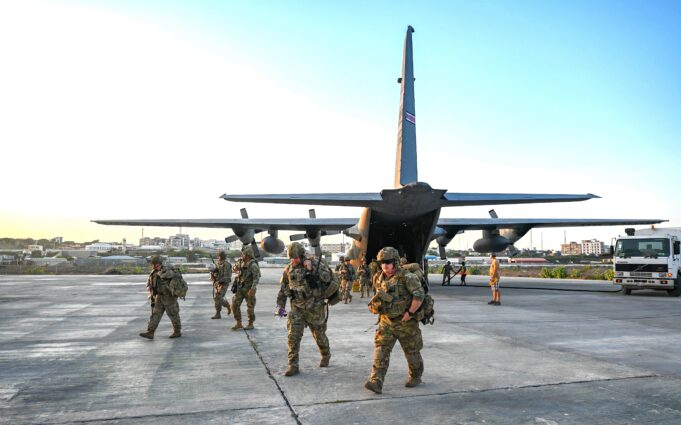Being a global economic power is no longer necessary if you are the world’s gendarme, or policeman.
Looking at the U.S. and its increasing global military presence, including NATO and U.S. Africa Command (Africom), the world’s largest distributor of corporate manufactured weapons of mass destruction is looking at military might as more important than economic might.
Serving as a global cop on the beat gives the U.S. Department of Defense the ability to interfere in African nations in the name of uprooting perceived present and future dangers.

In 2022, President Joe Biden signed an order authorizing the military to deploy Special Operations forces inside Somalia.
According to the New York Times, Biden revived “an open-ended American counterterrorism operation that has amounted to a slow-burn war through three administrations. The move (which many see as hypocritical) stands in contrast to his decision last year to pull American forces from Afghanistan, saying that ‘it is time to end the forever war.’ ”
The U.S. military presence in Africa is strategic and enduring. It ensures a fragmented continent pliable to Western interests and a “new Cold War” against Russia and China.
Consider the breakdown of North Africa and beyond after NATO, mainly the U.S. and France, invaded Libya in 2011, overthrew and assassinated Col. Muammar Gadhafi.
“Libya became a kind of ventre mou—a vulnerable point—for all the neighboring countries,” observed Mathias Hounkpe of the Mali country office for the Open Society Initiative for West Africa. “Mali, Niger, Chad all these countries to some extent have problems because we do not have stability in Libya,” Hounkpe told Britain’s Financial Times.
According to thetricontinental.org, after the Libyan invasion regional conflicts erupted and provided an excuse for more French and U.S. intervention.
“In 2014, France set up the G-5 Sahel, a military arrangement that included Burkina Faso, Chad, Mali, Mauritania, and Niger, and expanded or opened new military bases in Gao, Mali; N’Djamena, Chad; Niamey, Niger; and Ouagadougou, Burkina Faso,” said thetricontinental.org.
“The United States, for its part, built an enormous drone base in Agadez, Niger, from which it conducts drone strikes and aerial surveillance across the Sahel and the Sahara Desert. This is one of the many U.S. bases on the African continent. The United States has twenty-nine known military facilities in fifteen countries on the continent, while France has bases in ten countries. No other country from outside the continent has as many military bases in Africa,” according to “Defending Our Sovereignty: U.S. Military Bases in Africa and the Future of African Unity,” a 2021 tricontinental.org report.
U.S. special forces are already deployed across numerous African countries under agreements that are outright secret or, at best, lack transparency.
In 2019, U.S. Special Operations forces were deployed in 22 African countries: Algeria, Botswana, Burkina Faso, Cameroon, Cape Verde, Chad, Côte D’Ivoire, Djibouti, Egypt, Ethiopia, Ghana, Kenya, Libya, Madagascar, Mali, Mauritania, Niger, Nigeria, Senegal, Somalia, Tanzania, and Tunisia.
More than 14 percent of U.S. commandos deployed overseas in 2019 were sent to Africa, the largest percentage of any region in the world except for the greater Middle East.
In Ghana the U.S. was allowed to create its own military facilities and take some of Ghana’s sovereignty.
As far back as 2016, the African Union’s Peace and Security Council warned against “the existence of foreign military bases and establishment of new ones in some African countries, coupled with the inability of the Member States concerned to effectively monitor the movement of weapons to and from these foreign military bases.”
The council warned member states against pacts “that would lead to the establishment of foreign military bases in their countries.”
The U.S. military footprint “protects” its interests on the continent and works to prevent serious competition for control of Africa’s resources and markets.
“As Chinese private and public commercial interests have increased on the African continent, and as Chinese firms have consistently outbid Western firms, U.S. pressure to contain China on the continent has increased,” said one analysis. “The U.S. government’s new Africa strategy (2019) characterized the situation in competitive terms: ‘Great power competitors, namely China and Russia, are rapidly expanding their financial and political influence across Africa.’ ”
In 2019 Africom listed bases with an “enduring footprint,” or a permanent base, versus those with a “non-enduring footprint,” “lily pads,” or semi-permanent bases.
Fourteen countries had “enduring footprints” and 17 “non-enduring footprints.”
According to the U.S. National Defense Business Operations Plan (2018-2022), the U.S. military manages a “global portfolio that consists of more than 568,000 assets (buildings and structures), located at nearly 4,800 sites worldwide.” The U.S. also spends more on its military budget than the next highest 11 countries combined. China, which follows the U.S. in military spending, disburses only a third of what the U.S. spends annually.
Follow @JehronMuhammad on Twitter.













